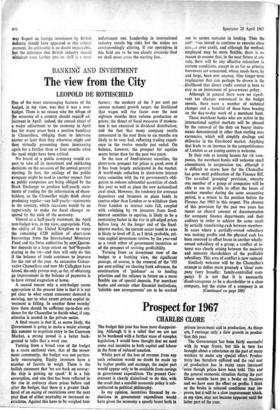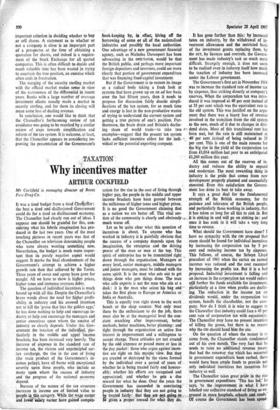The view from the City
BANKING AND INVESTMENT LEOPOLD DE ROTHSCHILD
One of the most encouraging features of the budget, in my view, was that it was a non- budget. There is no reason why the tempo of the economy of a country should require ad- justment in April: indeed, the annual ritual of a major adjustment to the economy in April has for many years been a positive handicap to Chancellors, obliging them to intervene sooner or later than they otherwise might and then virtually preventing them intervening again for a further three or four months when the need might have been critical.
No board of a public company would ex- pect to take all its investment and marketing decisions on the occasion of the annual general meeting. In fact, the analogy of the public company might be used in another respect. Just as public companies are being obliged by the Stock Exchange to produce half-yearly state- ments of trading for the information of share- holders, so the Chancellor might think about producing regular—say half-yearly—statements to the country, which occasions would be an opportunity to make the fiscal changes re- quired by the state of the economy.
Viewed as a half-yearly statement, the April non-budget was, in my view, appropriate. First, the ability of the United Kingdom to repay the remaining £320 million of short-term borrowings from the International Monetary Fund and the Swiss authorities by next llecem- ber depends to a large extent on 'hordeposits staying in the UK—and they will only do this if the balance of trade continues to improve for the rest of the year. As successive Conser- vative Chancellors and now Mr Callaghan have found, the only proven way, so far, of obtaining an improvement in the balance of payments is to have virtual stagnation at home.
A second reason why a non-budget seems appropriate at the present time is that it is not yet clear to what extent consumer demand is reviving, nor to what extent private capital in- vestment is falling. In another three months' time there should be sufficient up-to-date evi- dence for the Chancellor to decide what, if any, stimulus is needed in the private sector.
A final reason is that if, as seems likely, the Government is going to make a major attempt this summer to negotiate entry to the Common Market, a strong pound is a better back- ground to talks that a weak one.
Turning from a broad view of the budget to a more sectional view, that of the invest- ment community, the budget was not particu- larly encouraging. Equity investors have a number of factors to weigh. There is the bullish statement that 'we are back on course: the ship is picking up speed.' It is a fair assumption, and one that has been reflected in the rise in ordinary share prices before and after the budget, that there is a greater likeli- hood of an easing of restrictions over the next year than of either neutrality or increased re- strictions. Against this have to be weighed four factors: the modesty of the 3 per cent per annum national growth target; the likelihood that wages will rise faster over the next eighteen months than volume production or prices; the threat of fiscal measures if modera- tion is not exercised in dividend distribution; and the fact that many company results announced in the next three to six months are likely to be very bad, reflecting trading experi- ence in the twelve months just ended. On balance, however, the prospect for equities seems better than for the past two years.
In the case of fixed-interest securities, the short-term prospect for prices is good, even if it has been largely anticipated in the market. A world-wide reduction in short-term interest rates coincides with the ux government's obli- gation to redeem substantial quantities of stock this year as well as place the new nationalised steel stock. However, the tendency for overseas depositors and investors to place funds in centres other than London or to withdraw them from London as interest rates fall, coupled with switching by ux investors from fixed- interegt securities to equities, is likely to be a restraining factor in the rise in gilt-edged prices before long. At the longer end of the fixed- interest market, the current easier trend in rates is likely to level off if, as I think probable, pri- vate capital investment revives by the year-end as a result either of government incentives or of the prospect of reviving profitability.
Turning from an investment view of the budget to a banking view, the significant passage, of course, is the removal of the '105 per cent ceiling' on clearing bank advances, the continuation of 'guidance' as to lending priorities and the reliance in future on a more flexible use of special deposits. For merchant banks and certain other financial institutions, 'suitable new arrangements' are to be worked
out to secure restraint in lending. Thus the auti'-ities intend to continue to exercise close con 01 over credit, and although the methods employed may be more flexible, there is no reason to assume that, in the near future at any rate, there will be any effective relaxation in current conditions, except in so far as priority borrowers are concerned, whose needs have, by and large, been met anyway. One longer-term implication that can perhaps be drawn is the likelihood that direct credit control is here to stay as an instrument of government policy.
Although in general there were no signifi- cant tax changes announced in the budget speech, there were a number of technical changes and a handful of these have bearing on the day-to-day work of a merchant bank.
Those merchant banks who are active in the international capital markets will be pleased by the removal of the duty on bearer instru- ments denominated in other than sterling area currencies, which will simplify dealings and deliveries in the Eurobond market. Anything that leads to an increase in the competitiveness of London as an issuing centre is welcome.
In their role as issuing houses for UK com- panies, the merchant banks will welcome small amendments to corporation tax, although it is difficult to assess how far the Chancellor has gone until publication of the Finance Bill. The so-called 'grouping' provision, whereby one member of a group of companies will be able to use its profits to offset the losses of another member during the same accounting period, is a return to the position before the Finance Act 1965 in this respect. The absence of this provision for the past two years has meant an absurd amount of documentation for company finance departments and their auditors in order to achieve the same result by actually transferring cash between members. In cases where a partially-owned subsidiary was making profits and the physical cash has been removed to offset losses in another wholly- owned subsidiary of a group, a conflict of in- terest was clearly arising between the majority and minority shareholders of the profitable subsidiary. This area of conflict is now reduced.
Similarly welcome will be the Chancellor's attempt to define more precisely a 'close' com- pany (very broadly : family-controlled com- pany). It is not that it is necessarily disadvantageous to be a shareholder in a close company, but the status of a company is an
(Continued on page 500) important criterion in deciding whether to buy or sell shares. A statement as to whether or not a company is close is an important part of a prospectus at the time of obtaining a quotation for shares, and indeed is a require- ment of the Stock Exchange for all quoted companies. This is often difficult to decide and much valuable time has been wasted in trying to ascertain the true position, an exercise which often ends in frustration.
The merging of the security sterling market with the official market makes sense in view of the narrowness of the differential in recent years. Banks with a large number of overseas investment clients usually made a market in security sterling, and for them its closing will mean some loss of dealing revenue.
In conclusion, one would like to think that the Chancellor's forthcoming review of tax avoidance was going to be matched by a similar review of steps towards simplification and reform of the tax system. It is welcome, at least, that the Chancellor appears to considering im- proving the presentation of the Government's book-keeping by, in effect, hiving off the borrowing of some or all of the nationalised industries and possibly the local authorities. One advantage of a new government financial agency, such as Nicholas Davenport has been advocating in the SPECTATOR, would be that the British public, and perhaps more important foreign depositors and investors, could see more clearly that portion of government expenditure that was financing fixed-capital investment.
But if the Government is to restore its image as a radical body taking a fresh look at systems that have grown up on an ad hoc basis over the last fifteen years, then it needs to propose for discussion fairly drastic simpli- fications of the tax system, for so much time and energy is lost in the non-productive wastes of trying to understand the current system and getting a true picture of one's position. Fur- thermore, the brain drain and Britain's declin- ing share of world trade—to take two examples—suggest that the present tax system lacks sufficient incentive either for the indi- vidual or the potential exporting company.







































 Previous page
Previous page